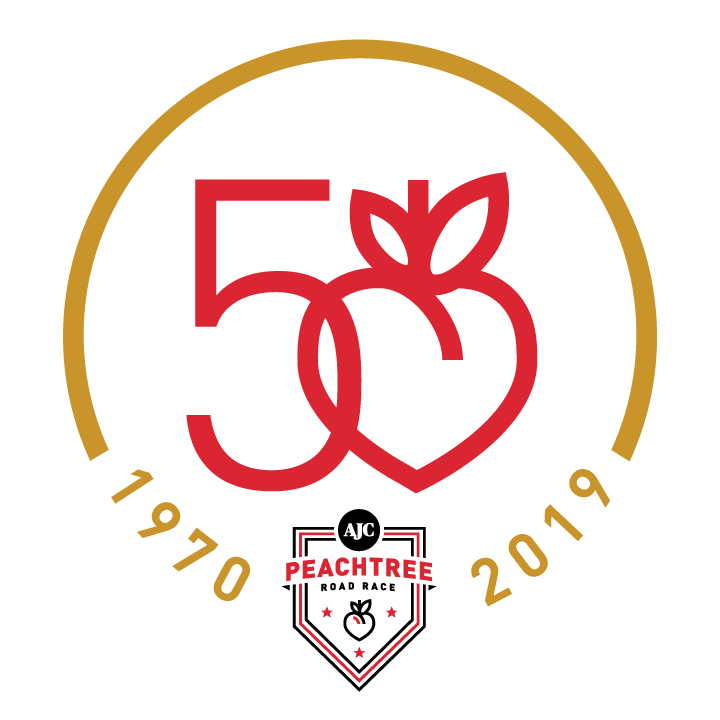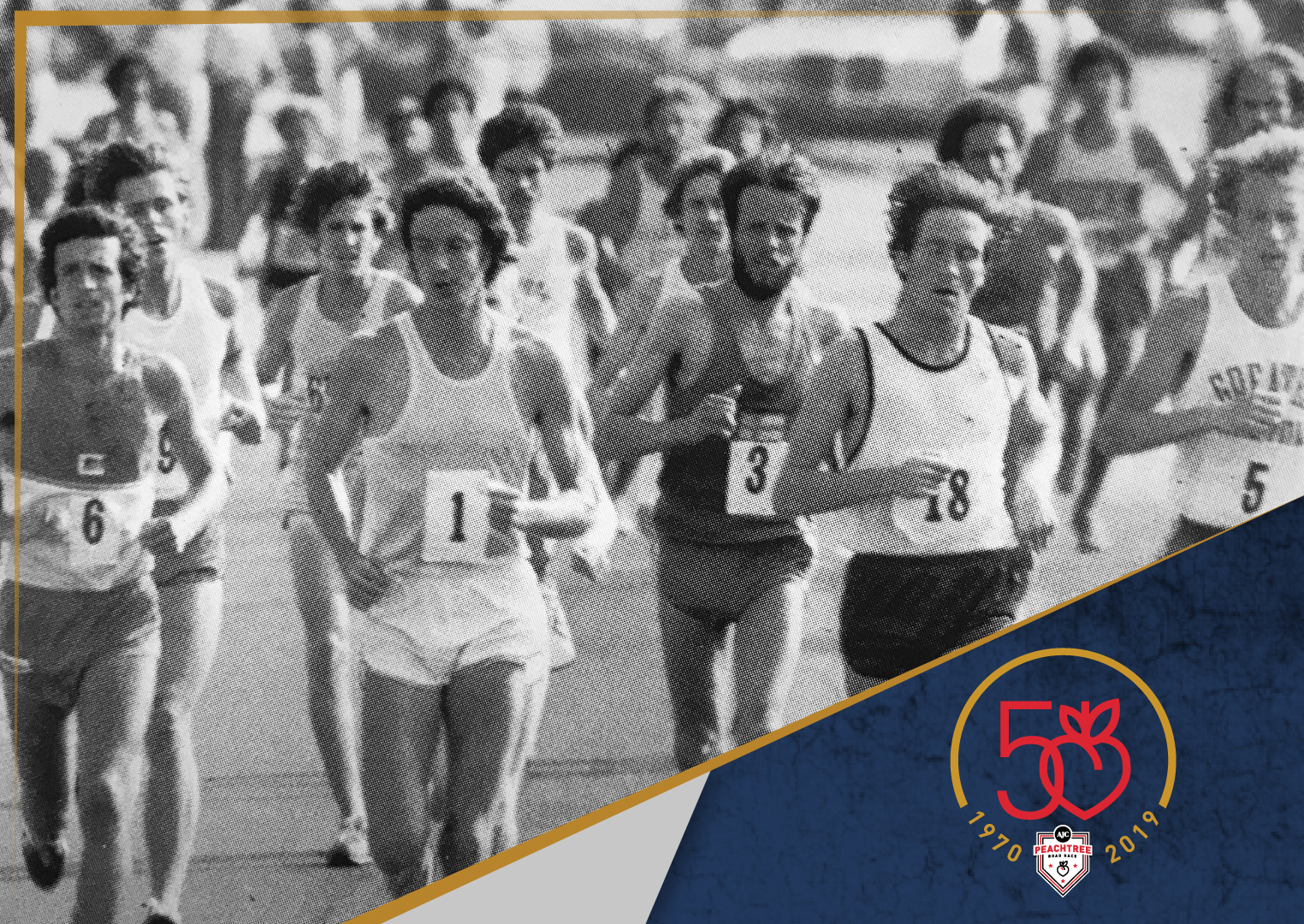How Churches Embraced the Peachtree

With the AJC Peachtree Road Race always run on the Fourth of July, it has only fallen on a Sunday seven times in its 49-year history. Today, parishioners along the course rise with the Peachtree’s participants to sing, cheer, support and even bless the 60,000 runners regardless of the day of the week.
It’s a far cry from 1982, when – as characterized in the book “25 Years of the Peachtree Road Race” – it was soles vs. souls.
A little over two miles into the course, runners come upon what’s known locally as Jesus Junction, the Buckhead intersection at Peachtree Road, East Wesley Road and Wesley Road where three churches firmly stand: Cathedral of Christ the King, Second Ponce de Leon Baptist Church and the Cathedral of St. Philip.
There, they see Dean Sam Candler of the Cathedral of St. Philip blessing thousands of participants with holy water as they run or walk by. “I’ve done this for so many years now, I’d say that 10-12,000 people deliberately swing over to our side of the course just to get their blessing,” he said.
Hundreds of parishioners join Dean Candler to cheer on participants as they venture the 6.2 miles to Piedmont Park – among them some of the Cathedral’s very own parishioners. Their names are collected in the weeks leading up to the race and posted for all to see under a “Cathedral of St. Philip blesses the AJC Peachtree Road Race” sign inside the church.
The Cathedral isn’t the only church along the course that gets involved on race day. With at least eight churches along the course, each celebrates the Peachtree in its own way.
“It has been an annual tradition for clergy and parishioners of Christ the King to gather on the sidewalks of Peachtree Road outside the Cathedral to cheer on racers,” said Jennifer Lewis, director of parish communications. “For over 20 years, the Cathedral has been a pit stop for racers receiving blessings from Father Richard Morrow.”
Back in the 1990s, Second Ponce de Leon Baptist Church adopted its own tradition of hosting a pasta dinner open to all race participants the night before Peachtree. "With all-you-could-eat pasta for just $5, it was a huge event with the church for many years," said Jeff Miller, church administrator. Today, you’ll find parishioners manning a water stop. "We always have way more volunteers than we need because everyone just wants to be a part of all the excitement,” said Miller, who hinted that the church is already planning something special for the 50th Running.
Despite the overwhelming support and celebration of the Peachtree these days, the church community did not always welcome the race with open arms. When the race fell on a Sunday on 1982, it was almost cancelled.
In 1970, its inaugural year, the race had so few runners – 150 starters – that it took up only one lane of traffic. It first fell on a Sunday in 1971 and then again in 1976, but the number of participants was still low enough that the church community wasn’t inconvenienced. By 1982, however, the race had grown to 25,000, so then-Race Director Royce Hodge sent a notice to churches alerting them to the race schedule, saying that traffic would be back to normal by 9:30 a.m.
It’s fair to say that Hodge didn’t expect the outrage that followed. Church leaders wanted the race moved a day earlier or later so it wouldn’t disrupt their Sunday services. With 40,000 members, the churches along the course appealed to race sponsors and asked government leaders to deny a race permit.
Although Peachtree officials offered to start the race half an hour earlier, church pastors rejected the compromise. Citing the July 4 tradition – as well as a cost of at least $12,000 to notify runners of a date change – race officials threatened to cancel the event.
Mayor Andrew Young was called in to mediate. “I couldn’t decide whether I was a preacher or a runner,” he said at the time, according to the 25th anniversary book. For two months, the dispute went unresolved, with even local media weighing in and choosing sides. While WGST radio denounced the “stubborn arrogance” of the Peachtree officials, the Atlanta Journal believed the church should find peace in a compromise.
Second Ponce De Leon Baptist Church
On May 17, the Club’s board of directors voted to keep the race on Sunday. The next morning, the church pastors met and decided not to press the issue any further. A compromise was found and a 15-minute, nondenominational sunrise service was held at 6 a.m. race morning. Years later, Mayor Young described the issue as “an Atlanta negotiation at its best.”
Fast forward to 1993, and the race was heading toward its 25th running. Knowing the race was due to fall on a Sunday that year, Julia Emmons – who in 1985 had become race director and executive director of Atlanta Track Club – worked proactively with the church community. “Starting as early as January, I made appointments with every single senior pastor,” she recently explained. “I dropped by every church, got to know them, explained why I was there and told them I wanted to work with them to make it the best experience possible.”
Emmons moved the race a half an hour earlier, to 7:30 a.m., and assigned a special volunteer team to each church to ensure that trash was picked up promptly and parking lots opened up quickly after the race. She even invited church ministers to participate and be seeded in the first wave so that they could both run and make it to church on time.
“The lovely thing about it all was they couldn’t have been nicer,” she said. “The beautiful irony was they were not only not opposed to us, but they went out of their way for us.” Some of the churches became water stops; some just came out to support by cheering. But it was Dean Candler who originally thought of the idea of blessing the participants.
“I’ll never forget [Julia] coming into the office prepared to apologize about the race being on a Sunday,” recalled Dean Candler. “I said ‘Don’t worry about it! How about we bless the racers with holy water?’ I told her we’d move church service down to Peachtree Road and welcome all the racers as they came by.”
Harkins giving the invocation in 2018
Emmons recalled the conversation fondly: “I gave him lemons, and he just made lemonade with that idea.”
“I thought, we are a blessing church, not a cursing church,” Dean Candler explained.
“The controversy with the church community really went back for years, but [Dean Candler] did a great job demonstrating grace,” said Rev. Dr. Bill Harkins, a priest associate at St. Philip. “He decided we’d take the church to the race and set a great example for others in the community.”
For many years, Dean Candler gave the invocation at the start of the race, but because of scheduling conflicts Rev. Harkins did so this year.
“As a priest who has run the race for 42 consecutive years, giving the invocation was a wonderful confluence of my vocational tapestry and was a moment of deep importance for me,” he said. “Running is a part of my identity and it was a real honor.” Rev. Harkins said he makes it a tradition to pause by St. Philip during his journey on the course, always delighting in seeing friends and parishioners.
He isn’t the only one. Today; thousands of participants look forward to the cheers and blessings at Jesus Junction and other churches along the course, which have become as integral to the Peachtree experience as Cardiac Hill and the finishers T-shirts.
“On the Fourth of July, God blesses America,” said Dean Candler. “I figure if I bless these people that come by, it’s a great symbol of God blessing humanity.”
The next time the race will fall on a Sunday? July 4, 2021.










